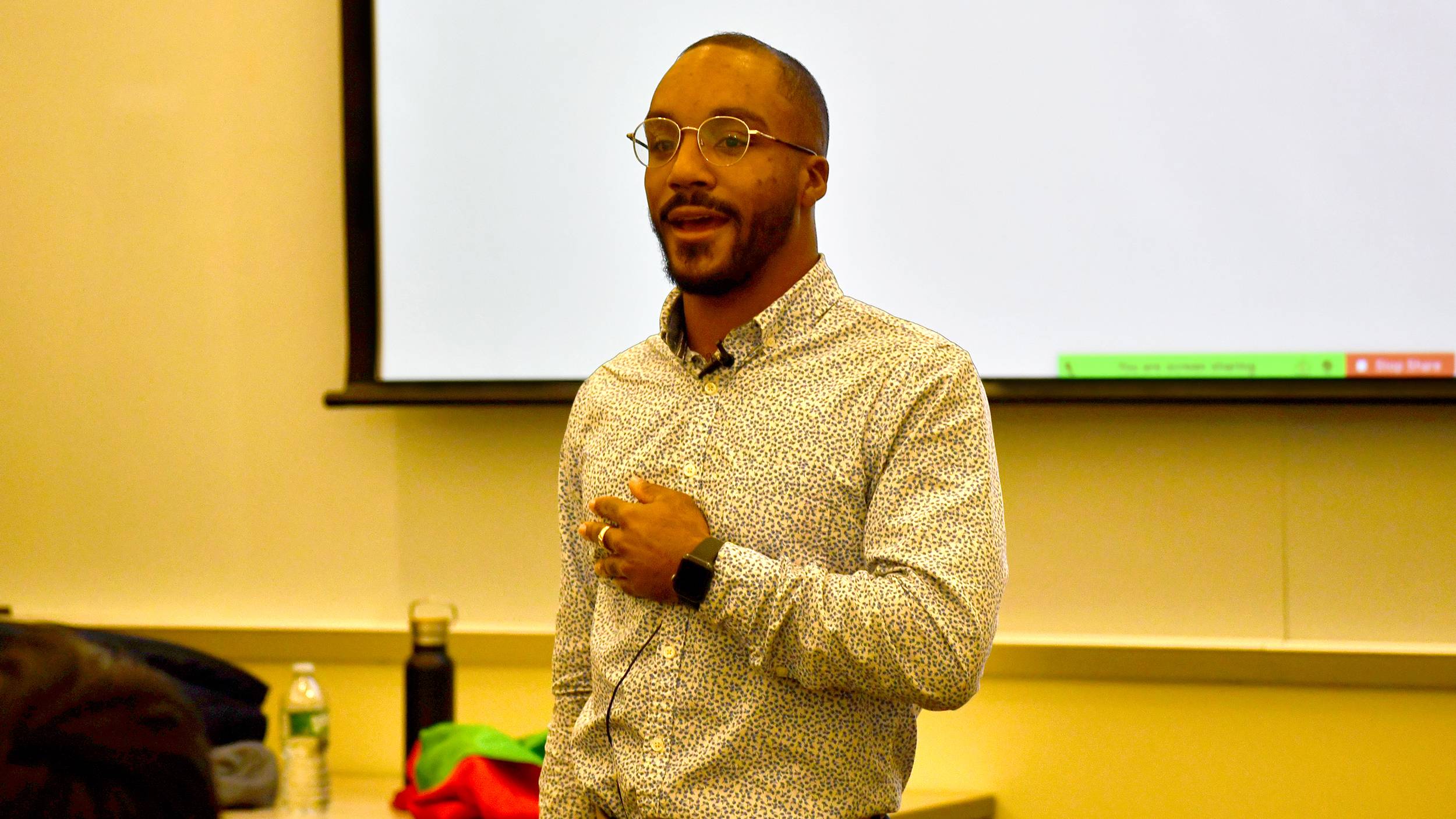Local and global challenges (read: resource scarcity and pollution) bring about opportunities for innovation and entrepreneurship.
Annika Gupta ’27 is building a sustainable, zero-emission, clothing brand that provides stylish garments for young women.
Harshitha Talasila ’26 is surveying food waste at dining locations across campus and connecting with local farmers to gauge interest in decentralized composting.
Chloe Tanous ’24 and Sarah Stenovec ’24 are co-leading a charge to create an online platform for the sustainable exchange of goods in the Colgate community.
These founders, along with those of more than 50 other ventures, participated in the second of four Thought Into Action (TIA) Incubator weekends, held Nov. 3–4 in Persson Auditorium and the Batza Meeting Room in Case-Geyer Library. Saturday’s Grand Challenge panel discussion was “The Big Five Imperatives in Sustainability: Opportunities for Local and Global Impact.”
While governments across the globe are working to make climate protection a priority, and private sector funding is buoying the transition to renewable energy and reducing waste, the “Earth is (still) warming at an unprecedented rate, (and) human activity is the principal cause.”1
To discuss the challenges and opportunities that lay ahead, TIA assembled an interactive panel discussion:
- Aditi Desai, director of partnerships at Voltpost, a climate-tech company focused on democratizing access to electric vehicle charging
- Katie James ’10, founder of Storyroot, and impact consultant and sustainability advocate
- John Pumilio, director of sustainability at Colgate University
You can view a recording of the panel discussion here. Joshua Repp, a contributing writer for the Colgate Maroon-News, penned this coverage of the sustainability discussion.
Kicking off this second of four Incubator weekend sessions was a keynote by Logan Higuera on AIdeation and no-code development. The founder of OpenOcean and a self-described “entreprenerd,” Higuera discussed his novel approach to leveraging AI technology in the entrepreneurial journey. In the past, entrepreneurs entered ideation with the task of generating as many ideas as possible, then converging and filtering them down to those that make the most sense, those that are the most applicable. This would require a group of at least three to four people ruminating for hours if not days.
With AI, “now you have the power of hundreds, maybe thousands of people to help you with this divergent process (in a matter of minutes),” Higuera said. To prove this practice, he solicited input from the room to AI-generate a start-up. Using Google Bard as well as other AI tools for name generation, logo design, and a landing page layout; within 16 minutes the basics for the refuse hauler “JUNKBUSTERS” were created.
“The power of AI is in using it as a brainstormer, or idea generator,” Higuera said. “I like to think of it as another person that you can kind of bounce ideas off.”
You can view the full recording of Higuera’s presentation here.
After Saturday’s Grand Challenge panel discussion on sustainability, TIA’s entrepreneurs and mentors migrated to the Batza Room for a keynote on the topic of “Entrepreneurship and Well-Being” by Frank Jackson. (He also spoke earlier in the day to First@Colgate program participants.)
Known as Mr. Positive and founder of The Pearl Effect, Jackson discussed the unique challenges that the entrepreneurship path has on an individual’s well-being.
“I want to shift your perspective,” Jackson said. “I want to build your understanding of well-being of happiness, and sort of interrupt your understanding of happiness and what you may think it is.
“A really big and important topic today is meaning. There are a billion tools I could give you related to your well-being and entrepreneurship. But today, we’re going to hone in on meaning and meaning-making.”
In one segment, Jackson asked the audience for the definitions of “happiness” and “well-being.” The former is the result of an emotional response, such as recalling a joyous moment captured in a photo. But that can shift, such as learning that someone in the photo has passed away. Well-being is a deeper story, is more holistic; it is physical, emotional, about purpose, and is other people focused, Jackson said.
Because entrepreneurs can have a moment of happiness — a major technology breakthrough — followed by a destabilizing moment — that technical win is substantially more than their budget can afford, the “elixir” to the hardships of entrepreneurship is community.
“(We can look) at entrepreneurship as a communal aspect. Even if we have different tasks, many people have co-founders – that’s community, right? We’re in a space of mentorship and community that can be an elixir, something where resilience doesn’t have to be the pervasive tool that we are utilizing,” Jackson said.
Watch the full recording of Jackson’s keynote on our YouTube channel.
The remaining keynote speakers for Incubator sessions Feb. 2–3, 2024, and March 22–24, 2024 will be announced at a later date.
Source:
1NASA Global Climate Change
